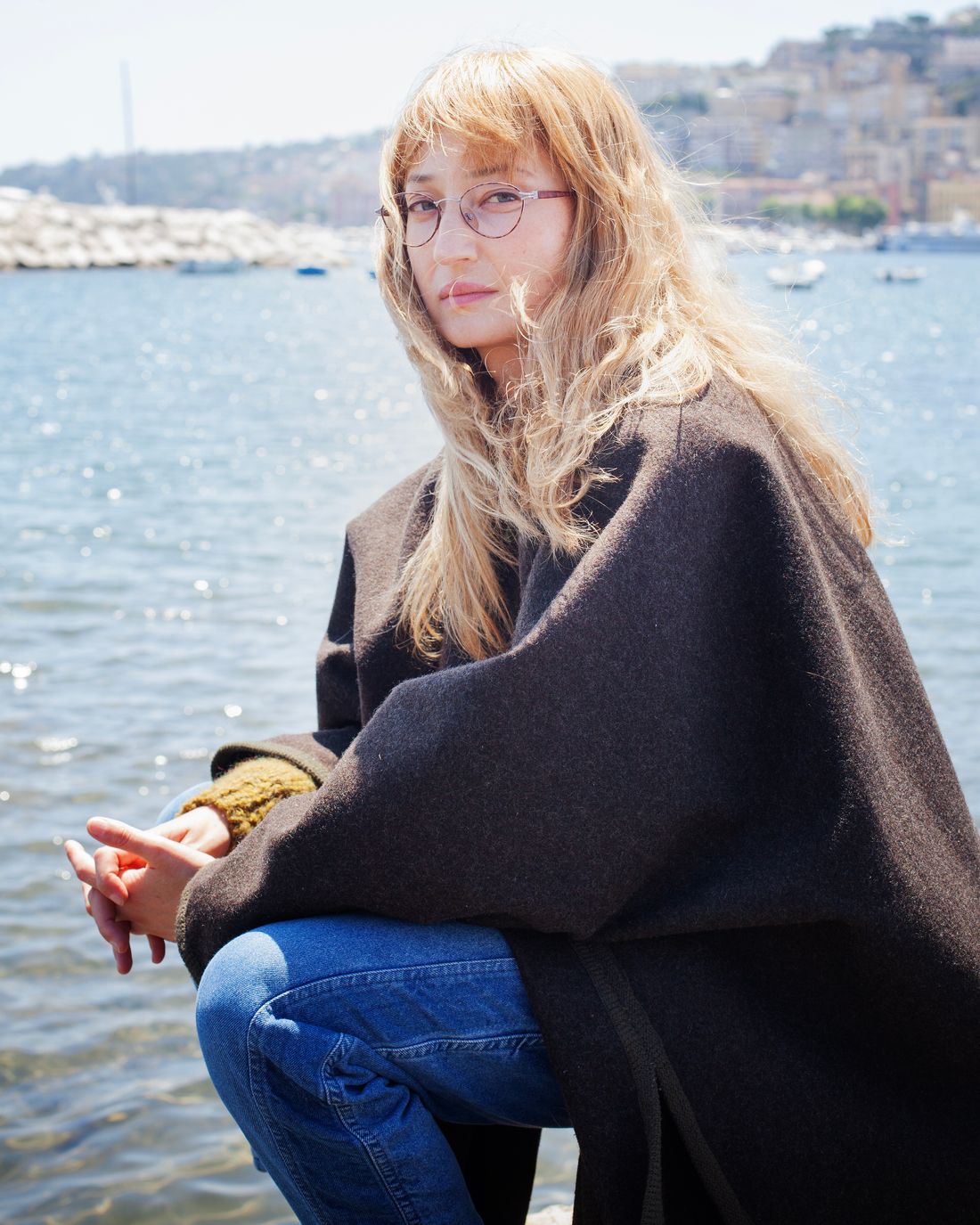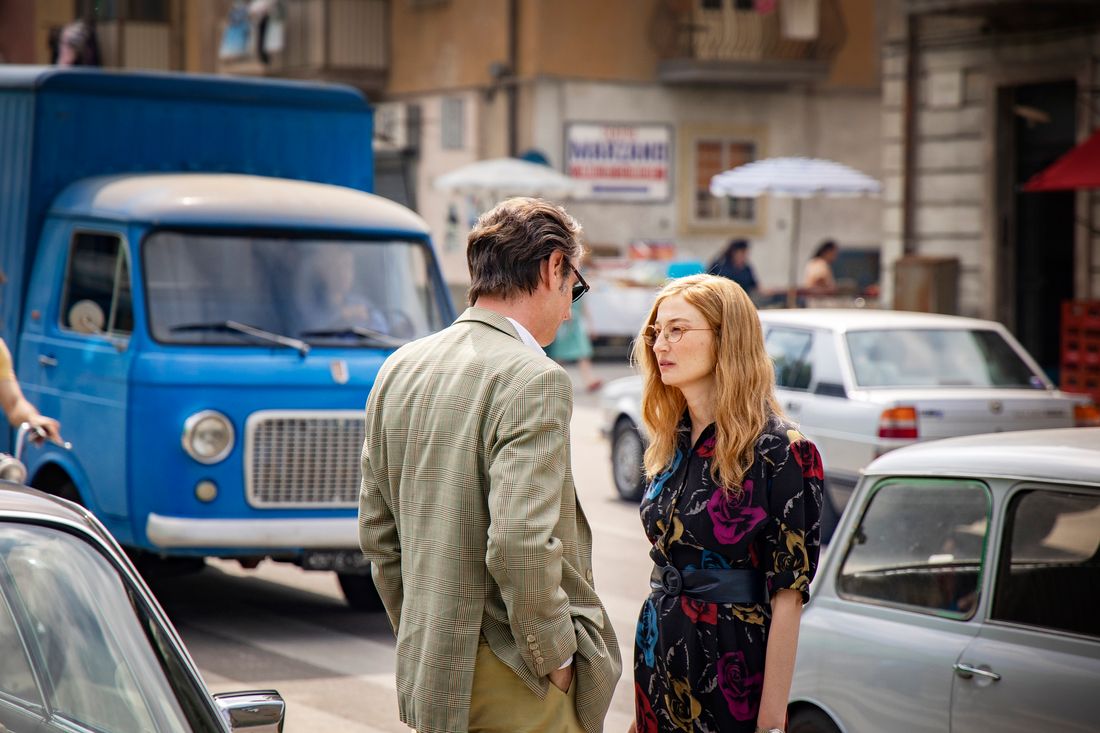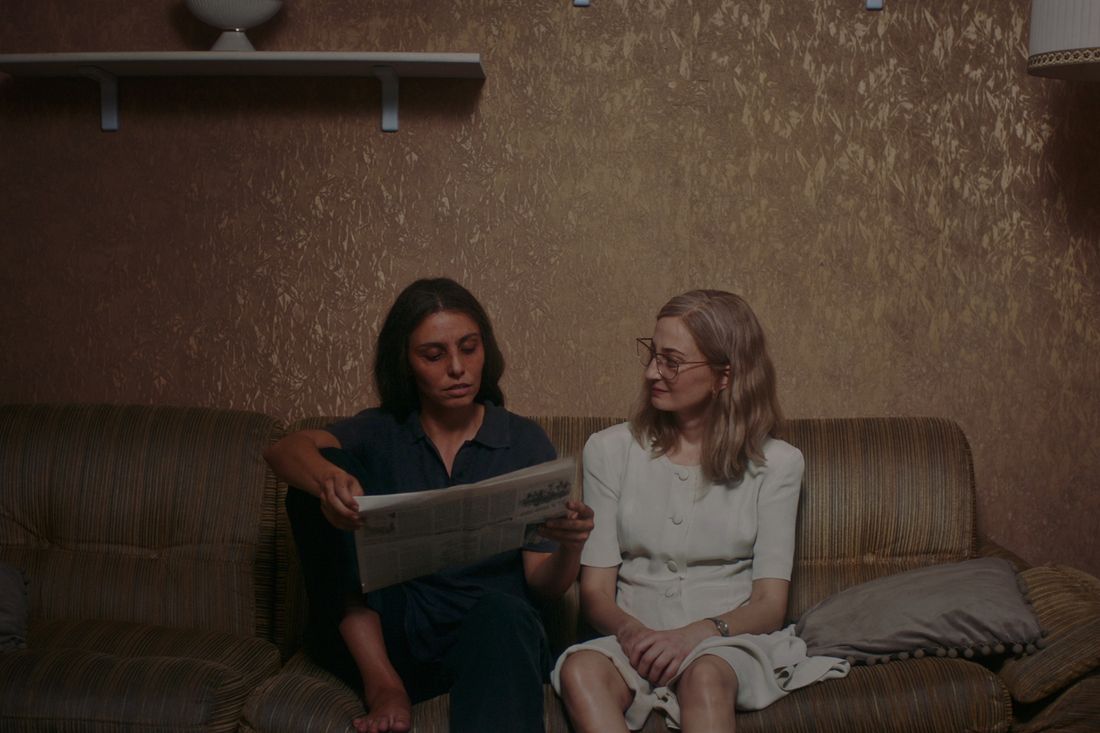
I’ve had the immense privilege of immersing myself in Elena Greco’s world for seven years now, and it feels like saying goodbye to a lifelong friend. Playing her has been more than just an acting gig; it’s been a transformative journey that has intertwined with my own life in profound ways.
By the time Alba Rohrwacher makes her appearance in the fourth season of “My Brilliant Friend“, we’ve already become familiar with her voice due to her narration in HBO’s adaptation of Elena Ferrante’s novels since its debut in 2018. However, taking over from Margherita Mazzucco, who brilliantly portrayed Elena “Lenù” Greco from adolescence to early adulthood in the first three seasons, was no easy feat for Rohrwacher. She needed to embody Lenù in her mature form, a task that required uniting her voice with her face to perfectly capture Elena’s strength and vulnerability at a pivotal moment when her desires and actions finally coincide. Now an older and accomplished writer, Rohrwacher’s Lenù is more assertive and forceful, yet she still retains the cool detachment that Mazzucco brought to the role. Speaking about the character, Rohrwacher, known for roles in “La Chimera”, “The Lost Daughter”, and “I Am Love” among others, expresses her fascination with Lenù’s complex, controversial, and mysterious nature. She admits that she identified with Lenù throughout the process, but was overjoyed to see her character finally break free.
In the fourth season, titled “The Tale of the Missing Child“, Lenu is deeply engrossed in her relationship with Nino, moving her daughters back to Naples to live with him. After he deceives her, she grows even closer to Lila (brilliantly portrayed by Irene Maiorino). Both friends give birth to daughters who later become inseparable. As the families intertwine, Lenu finds creative motivation from the turbulent, destitute neighborhood that shaped her. The subtitle refers to the disappearance of Lila’s daughter Tina, but in the final episode, it is Lenu who loses her eldest daughters in a way: Elsa departs with Lila’s son Gennaro, whom Dede had long admired, while heartbroken Dede joins her father in America. The finale’s climactic moment revolves around a poignant goodbye between the friends. When Lenu decides to leave Naples permanently, Lila discloses her secret belief that Tina was kidnapped because she was mistaken for Lenu’s daughter in a news photo. “Was it my success that caused her daughter’s kidnapping?” Rohrwacher narrates, as a troubled-looking Elena. “Why did she tell me now? Was it to administer one last dose of poison, to punish me because I was leaving her?
After seven years of working on this show, I find myself concluding this chapter. It’s been an extraordinary journey exploring the depths of this character, as if I were embarking on a voyage with my voice to become one with another persona – a character that carries both identity and consciousness. Achieving harmony between the voice and the face in season four felt like reaching dry land after a long, uncertain sea voyage. It brought me a sense of relief, freedom, but also a profound sense of responsibility, as I stepped into the shoes of someone who had already brilliantly portrayed this character before me.
What led you to take on this role initially? To begin with, I was the narrator for the series. However, I didn’t realize that I would eventually portray adult Elena. It was a wonderful experience collaborating with Saverio Costanzo, the show’s creator and director of the first two seasons. We had previously worked together on three films, including “Hungry Hearts” with Adam Driver, and we have a strong artistic bond. Beyond our professional relationship, we are also in a romantic partnership. I find it particularly rewarding to work with people I am deeply familiar with, and Saverio is someone I’ve always enjoyed collaborating with.
In the dim-lit editing room, I focused on adjusting my voice to resemble Margherita’s. I meticulously studied every aspect of the young Elena character. I invested numerous days on set to grasp their methods, aiming to imbue my voice with their essence. Given my deep affection for Ferrante’s literature and prior experience with reading her books in Italy, I was eager to delve into this project.
In our interactions, Margherita guided me on embodying the character Elena. The Elena portrayed with Saverio in the initial seasons became a benchmark for mine. My aim was to capture her distinctive character traits. Margherita was exceptional at being both engaging and enigmatic. While Lila is the character that keeps secrets, I believe Elena is the one who remains mostly unknown to us.
I aimed to expand upon and refine the work I did with Daniele Luchetti, a director I’ve collaborated with on two films. Together, we shaped the character of Elena, aiming for a resemblance to Margherita’s portrayal. I devoted myself extensively to dialect coaching, focusing on mastering the Neapolitan accent. At this stage, Elena no longer speaks dialect – it’s written that she intentionally erased her language with great force – so we focused on finding the right intonation and unique melody that Margherita had. I could never embody Lila because she speaks authentic Neapolitan. Taking on the role of Elena was something I felt I could authentically portray.
Daniele, Margherita, and I captured the final scene for season three, where Margherita encounters my reflection in a real aircraft’s mirror.
Which aspects of Margherita’s portrayal did you incorporate into your own performance? I found myself focusing on her intense gaze, the subtlety in her eye movements, and the austerity that defined her character in the first and second seasons. It was essential to maintain the initial, more distant Elena within me while also allowing for the character’s natural evolution with age. This balance between the older and younger aspects of her character guided my performance.
In the fourth season, Elena’s desires and actions become more congruent than ever. She becomes assertive, challenges her mother-in-law, and even stands up to her own mother. I had to tone down my energy to embody Elena, while remaining faithful to Margherita’s portrayal but also introducing fresh aspects of Elena.
Where did you discover those fresh ideas? They originated from the book since it was essentially the Bible to me, constantly by my side, day and night. Elena Ferrante’s works and the show created my universe, a solitary world I inhabited. I would rise, dress, reach the set. Reading Ferrante’s texts always guided me correctly. During discussions on set, we often agreed, “Alright, let’s search for the solution in her writing.
In the latest novel, we see Elena taking a more proactive role. She’s learned to confront her shortcomings effectively. Occasionally, while reading, Lila’s voice echoed in my thoughts, urging Elena on with words like “C’mon, Elena, c’mon!
She frequently deceives herself, yet she’s exceptionally truthful when it comes to others. Her skill in storytelling grew remarkable due to this unique trait.

How did you approach portraying Lenù, showing both how she perceives herself and how others view her, as depicted in the book versus the adaptation where there seems to be a sense of objectivity, allowing us to witness her self-deception and flaws?
Lila provides the motivation, serving as the enigma she’s pursuing for Elena. A moment from season one clarified their characters for me. In this scene, Lila yearns to visit the sea, while Elena hesitates about missing school. They conceal their bags and walk beneath a bridge. Once they surpass the tunnel, the horizon emerges, causing Lila to pause. It’s Elena who encourages them, saying, “Let’s go.
There is a phrase in Italian, lei cammina in il mondo, which is like “She walks in the world.” Elena goes horizontally, she’s epic. The epic is something large. She moves, she discovers. And Lila — she digs. She’s vertical, like a Greek tragedy. She goes into herself.
What was it like collaborating with Irene Maiorino as a co-actor?
Since we hadn’t previously worked together, we began to familiarize ourselves through our respective characters. There was an unusual yet potent connection between us that made each scene electric. I believe the same enchantment occurred between Margarita and Gaia, something magical reminiscent of the novel. The power of this character’s energy was unprecedented for me. When Lenù is portrayed with another actor as Lila, the scripted relationship instantly transforms into reality.
In what capacity did Ferrante participate in the TV series? Have you ever communicated with her personally?
She seemed almost omnipresent, as if guiding my character’s development through her writing. She was part of the initial process for My Brilliant Friend, and she maintained a writing relationship with Saverio. They exchanged numerous emails. He held a unique connection with her. On one occasion, they invited him to deliver a speech alongside an acclaimed Italian writer and journalist named Goffredo Fofi, and they asked me to read the letters Ferrante wrote to Saverio at the Turin Book Festival. [In hushed tones] It was an extraordinary experience. I felt like I was uncovering a private, precious artifact.
In this remarkable production, I found myself deeply immersed – every aspect, every nook and cranny felt familiar to me. For instance, when we captured the scene in the apartment during the third episode, where the mother and Elena had their heated argument, I could visualize with startling clarity the location of my childhood bed because I was present for the filming. The moment the mother struck Elena and her glasses shattered on the floor, I could vividly recall where they landed. The mother’s words to me weren’t just dialogue from a scene; they stirred memories that were not merely reminiscences born of watching the footage, but tangible recollections from my own life. Throughout this journey, I found myself constantly drifting back to the past.
How did you feel on set while tackling some of the most profound scenes in the series, given that Director Laura Bispuri is someone I trust and have worked with three times? As challenging as it was, filming was also a beautiful experience. Despite the hurdles, we were conscious of the significance of finding the perfect moment, the right emotion.
Was there a specific scene that proved difficult during the filming process? Let me know which one comes to mind.
When I see Elena discovering Nino with the housekeeper, it’s a moment that leaves me aching. Oh, so painful! It was such an unexpected and shocking scene when I encountered it while reading the novel.
In the movie version, it’s particularly distressing as the camera lingers with Elena, waiting for Nino to acknowledge her. The passage of time is painfully evident, making it all the more heart-wrenching.
I’ve been pondering it myself after the earthquake… She hasn’t managed to get in touch with Nino yet, so Lila and I decide to pay him a visit at his place, but he wasn’t there. It’s those moments that life seems to hit us hardest when Lila’s family return to their neighborhood, only to find Elena all by herself.
In this series spanning multiple years, how did you portray Lenù’s aging process? I appreciate that Elena in the finale seemed reminiscent of my mother when I was young – a woman around 50 but radiating youthfulness. Her vanity has diminished, though Elena still retains a hint of it – the hairstyle, the understated attire.

Which Lenù outfit or piece of clothing from the current season do you favor most? I’m partial to the glasses. Those glasses reveal her maturity and they transform over time.
In an interview with Sofia Coppola, your sister Alice Rohrwacher mentioned that working together could be risky due to their strong bond which can sometimes lead to disagreements. Did you utilize your relationship in portraying the dynamic between Lila and Elena? Possibly. My sister is my world, yet it’s intricate because we are so interconnected and honest with each other. It’s rare to find people who tell you the truth, as it can sometimes be uncomfortable. However, for me, it’s a gift. With Elena and Lila, it’s even more convoluted since it involves not just telling the truth but also provoking one another. I would never endanger my sister, and she would never jeopardize me. We always look out for each other. Disagreements may occur during a scene when I say, “Alice, I don’t think it feels right,” and she responds, “Why don’t you believe it? I’m the director.” Then she addresses my vulnerabilities because she knows me well. I believe Elena and Lila are more complex and potentially more hazardous.
It makes me think of the line in the finale when they say good-bye. Elena says, “In the end, I had only run into more proof of how splendid and shadowy our relationship was.”
This was a line that made me cry so much because it’s the truth. But this is friendship, which is different from sisterhood. Because they could put the other in danger. For example, if my sister knows something about my boyfriend, she’d immediately call me and tell me.
Lila grips it tightly. Yet, it seems unfair. In the ninth episode, her behavior towards Nino, flirting as she does, appears quite peculiar.
What was your response when depicting that distressing scene following Lenù discovering Nino with the housekeeper, as Lila accuses him of trying to manipulate Lenù for her? It’s as if all of Lenù’s worst fears are realized. Well, my reaction [I covered my ears]. This is how I felt. It wasn’t scripted. I believe there’s an unusual form of addiction between them. However, I also think that Elena provoked Lila and Lila, in turn, provoked Elena.
In a surprising turn of events just before they parted ways, Elena confessed, “If you ever write anything, wouldn’t you share it with me?” Unbelievable! Lila is shattered, feeling insignificant and void, yet the rivalry persists as Elena seeks her input for any book idea she might have.
It’s tough to bid farewell to Elena after seven years. She’s been a significant part of me, and letting her go isn’t easy. After the show ended, I immediately moved on to another role where I played someone entirely different. However, Elena held a special place in my heart, almost like a secret strength.
She became your Lila.
Yes. In my acting life, she became my Lila.
Read More
- Hades Tier List: Fans Weigh In on the Best Characters and Their Unconventional Love Lives
- W PREDICTION. W cryptocurrency
- Smash or Pass: Analyzing the Hades Character Tier List Fun
- PENDLE PREDICTION. PENDLE cryptocurrency
- Why Final Fantasy Fans Crave the Return of Overworlds: A Dive into Nostalgia
- Sim Racing Setup Showcase: Community Reactions and Insights
- Understanding Movement Speed in Valorant: Knife vs. Abilities
- Why Destiny 2 Players Find the Pale Heart Lost Sectors Unenjoyable: A Deep Dive
- How to Handle Smurfs in Valorant: A Guide from the Community
- Dead by Daylight Houndmaster Mori, Power, & Perks
2024-11-12 19:55